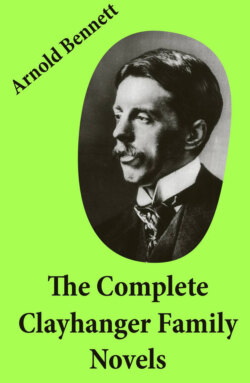Читать книгу The Complete Clayhanger Family Novels (Clayhanger + Hilda Lessways + These Twain + The Roll Call) - Arnold Bennett - Страница 138
На сайте Литреса книга снята с продажи.
Two.
ОглавлениеAt nine o’clock, in a most delicious mood of idleness, Edwin strolled into the shop. His father had taken down one shutter from the doorway, and slanted it carelessly against another on the pavement. A blind man or a drunkard might have stumbled against it and knocked it over. The letters had been hastily opened. Edwin could see them lying in disorder on the desk in the little office. The dust-sheets thought the day was Sunday. He stood in the narrow aperture and looked forth. Duck Square was a shimmer of sunshine. The Dragon and the Duck and the other public-house at the top corner seemed as usual, stolidly confident in the thirst of populations. But the Borough Dining Rooms, next door but one to the corner of Duck Square and Wedgwood Street, were not as usual. The cart of Doy, the butcher, had halted laden in front of the Borough Dining Rooms, and the anxious proprietor, attended by his two little daughters (aproned and sleeved for hard work in imitation of their stout, perspiring mother), was accepting unusual joints from it. Ticklish weather for meat—you could see that from the man’s gestures. Even on ordinary days those low-ceiled dining-rooms, stretching far back from the street in a complicated vista of interiors, were apt to be crowded; for the quality of the eightpenny dinner could be relied upon. Edwin imagined what a stifling, deafening inferno of culinary odours and clatter they would be at one o’clock, at two o’clock.
Three hokey-pokey ice-cream hand-carts, one after another, turned the corner of Trafalgar Road and passed in front of him along Wedgwood Street. Three! The men pushing them, one an Italian, seemed to wear nothing but shirt and trousers, with a straw hat above and vague slippers below. The steam-car lumbered up out of the valley of the road and climbed Duck Bank, throwing its enormous shadow to the left. It was half full of bright frocks and suits. An irregular current of finery was setting in to the gates of the Wesleyan School yard at the top of the Bank. And ceremoniously bedecked individuals of all ages hurried in this direction and in that, some with white handkerchiefs over flowered hats, a few beneath parasols. All the town’s store of Sunday clothes was in use. The humblest was crudely gay. Pawnbrokers had full tills and empty shops, for twenty-four hours.
Then a procession appeared, out of Moorthorne Road, from behind the Wesleyan Chapel-keeper’s house. And as it appeared it burst into music. First a purple banner, upheld on crimson poles with gilded lance-points; then a brass band in full note; and then children, children, children—little, middling, and big. As the procession curved down into Trafalgar Road, it grew in stature, until, towards the end of it, the children were as tall as the adults who walked fussily as hens, proudly as peacocks, on its flank. And last came a railway lorry on which dozens of tiny infants had been penned; and the horses of the lorry were ribboned and their manes and tails tightly plaited; on that grand day they could not be allowed to protect themselves against flies; they were sacrificial animals.
A power not himself drew Edwin to the edge of the pavement. He could read on the immense banner: “Moorthorne Saint John’s Sunday School.” These, then, were church folk. And indeed the next moment he descried a curate among the peacocks. The procession made another curve into Wedgwood Street, on its way to the supreme rendezvous in Saint Luke’s Square. The band blared; the crimson cheeks of the trumpeters sucked in and out; the drum-men leaned backwards to balance his burden, and banged. Every soul of the variegated company, big and little, was in a perspiration. The staggering bearers of the purple banner, who held the great poles in leathern sockets slung from the shoulders, and their acolytes before and behind who kept the banner upright by straining at crimson halyards, sweated most of all. Every foot was grey with dust, and the dark trousers of boys and men showed dust. The steamy whiff of humanity struck Edwin’s nostrils. Up hill and down dale the procession had already walked over two miles. Yet it was alert, joyous, and expectant: a chattering procession. From the lorry rose a continuous faint shriek of infantile voices. Edwin was saddened as by pathos. I believe that as he gazed at the procession waggling away along Wedgwood Street he saw Sunday schools in a new light.
And that was the opening of the day. There were to be dozens of such processions. Some would start only in the town itself; but others were coming from the villages like Red Cow, five sultry miles off.
